 It’s my second time in Kashgar. I had left there for the Kharakorum highway two days ago… traveled the fairytale road through the Kunlun and the Pamir Mountains… along Karakul Lake… into grasslands with camels grazing… past yurts and old villages… crumbing tombs and monuments of forgotten antiquities to Tashkurgan, a Tadjik town of neat poplars… the last town in China before crossing over into Pakistan through the Khunjerab Pass.
It’s my second time in Kashgar. I had left there for the Kharakorum highway two days ago… traveled the fairytale road through the Kunlun and the Pamir Mountains… along Karakul Lake… into grasslands with camels grazing… past yurts and old villages… crumbing tombs and monuments of forgotten antiquities to Tashkurgan, a Tadjik town of neat poplars… the last town in China before crossing over into Pakistan through the Khunjerab Pass.
I hunt for an old fort I never quite find and walk to the grasslands, the mist suspended between the plain and the mountain. I am in a Shangri-La and wander about the town buying up tea and Tadjik music. I sit in a music shop waiting for the clerk to cut DVD’s for me… life comes and goes… a mother and a small child, her eyes swept up with black kohl and her jangling about with coins on her traditional clothes. She must be a little dancer, and I make friends… ask her mother if I can give her a piece of candy… the child smiles the candy smile of children everywhere. Young men come in. They are serious about this business of music. It is the lifeblood of this world… the oral language… the poetry… that holds who they are together. In the evening I sit out under the trees drinking tea at the Pamir Hotel. Someone snaps a picture of me. Weeks later, I will paste it in a book with quatrain that captures the elusive nature of this place ~
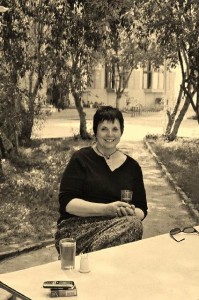 Come to the orchard in spring.
Come to the orchard in spring.
There is light and wine and sweethearts in the pomegranate flowers.
If you do not come, these do not matter
If you do come, these do not matter.
~~Rumi
How difficult it is to leave the magic of this place. My room is next to the road and the sound of the wind through the poplars blows through the open window at night… a pleasure to wake up during the night just to hear it. I get ready to go after breakfast. The road disappears behind me… the sand smoothly descends in the glass marking the hour… one continuous flow, and, so quickly, Kashgar is up ahead.
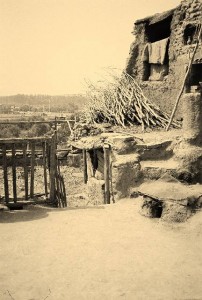 Kashgar becomes my home after three days there. I visit the famous old Sunday livestock market… walk among the braying mules… the cows, sheep and horses… a small pocket of what has not changed for hundreds of years. I whirl forward to find phone cards on the street, settle on a clean restaurant, find a reliable Internet bar with over 500 stations in a huge smoke-filled room… a place always brimming with people.
Kashgar becomes my home after three days there. I visit the famous old Sunday livestock market… walk among the braying mules… the cows, sheep and horses… a small pocket of what has not changed for hundreds of years. I whirl forward to find phone cards on the street, settle on a clean restaurant, find a reliable Internet bar with over 500 stations in a huge smoke-filled room… a place always brimming with people.
The maids in the hotel take care of me and bring me a sack of food for breakfast every morning. They wash my clothes and whisper with each other as I walk by. I have a lot of fun with the cab drivers. They don’t understand a word of Chinese. I hand them the card for the hotel… of course, they can’t make it out. I say, “Mao Zedong” and raise my hand like the huge Mao statue in the square. Once they know what I am doing, they take me there and I can direct them from there to my hotel. I weary of the game quickly and set out walking each day instead.
I visit the Grand Bazaar to buy a head scarf… search around looking at this and that. A shopkeeper offers an unusual kind of raisin grown in this part of the world. I taste one… it is divine, but he wants over seven dollars for a pound of them and I wave him off laughing. I know I can find them elsewhere… but I never do, and sometimes, I am lost in grumbling thoughts of having none… the sweet memory arising because I was permitted just one… and, soon, I am satisfied with that. I visit the Old Town… bargain for heavy gold, a good bargain. But, I don’t buy it. I’m offered a free spoon of shaved ice milk and flavoring, a scary slurry that I do taste… dirty spoon and all. I laugh as I hear my grandmother, “Eat it in the name of the Lord”… and I do and never get sick. The shopkeeper has been so kind, I’d rather risk illness than offend him. I buy bread in the street from an old man whose piercing look of kindness will remain with me forever.
As twilight comes, I stop in the old street of wooden houses with balconies to watch the muezzin rocking back and forth on the roof of a small mosque reciting the adhan…the call to prayer. Later, after fard salah, I walk in the cool lanes of the Id Kah Mosque under the poplars when the women promenading in the coolness in the gardens there. An old woman with her two granddaughters glides toward me. They are wearing bright colored clothing of red and orange silk that can only be properly described as “raiment”… the faces of the young are made up perfectly. She takes my hand… yet another hand-holding… looks into my eyes with honest sincerity, and we trade a “yahshimusiz”….hello….we visit a little in our awkward Chinese and I leave them with a “rahmat” and “khosh”…a thank you and good-bye… my paucity of Uyghur far exceeded by the glow they have left in me… well wishes for a dusty, tattered stranger in a far-flung place called Kashgar.
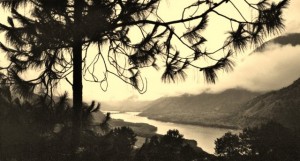 Something is missing, though. I can feel it everywhere… and it isn’t until the women leave that I realize I am really homesick for Cindy… the Princess of Sea Shells and Birds. Her boyfriend, Felix, and I had given her that name when they had visited me in Spain. I had cooked platters of food… mountains of shrimp and fish… taught them how to make tortilla as we bickered back and forth between their long walks on the beach. Cindy had wanted to travel to Kashgar with me, but that carefree life of a student has passed.
Something is missing, though. I can feel it everywhere… and it isn’t until the women leave that I realize I am really homesick for Cindy… the Princess of Sea Shells and Birds. Her boyfriend, Felix, and I had given her that name when they had visited me in Spain. I had cooked platters of food… mountains of shrimp and fish… taught them how to make tortilla as we bickered back and forth between their long walks on the beach. Cindy had wanted to travel to Kashgar with me, but that carefree life of a student has passed.
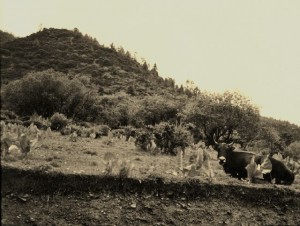 Cindy and I had traveled together when she was 17. Her mother “dispatched” us both to Yunnan. We had wound up and up through the mountain roads. The Cai Hua, bright yellow, was still in bloom and fat pumpkins grew down the hillsides. We passed flowing streams and houses with cottage gardens until we arrived in Lijiang, the Naxi town of canals and the sound of water burbling everywhere. In a youthful show of resistance, Cindy had argued with me that she did not want to see the Naxi Orchestra. I was a stalwart, responsible stand-in for her
Cindy and I had traveled together when she was 17. Her mother “dispatched” us both to Yunnan. We had wound up and up through the mountain roads. The Cai Hua, bright yellow, was still in bloom and fat pumpkins grew down the hillsides. We passed flowing streams and houses with cottage gardens until we arrived in Lijiang, the Naxi town of canals and the sound of water burbling everywhere. In a youthful show of resistance, Cindy had argued with me that she did not want to see the Naxi Orchestra. I was a stalwart, responsible stand-in for her  mother who often made Cindy do the things she thought would make her grow as a person… bought the tickets anyway.
mother who often made Cindy do the things she thought would make her grow as a person… bought the tickets anyway.
We found our seats in the theater decorated with the trappings of Naxi culture… the Song Dynasty melodies out of the Taoist Dong Jin Scriptures were plaintive coming down from the years in ways that can only be understood through music. The Orchestra was as old as Kublai Khan who had founded it… and the old men who played the antique instruments seemed as old as the Khan himself. Some of them had been so old, they 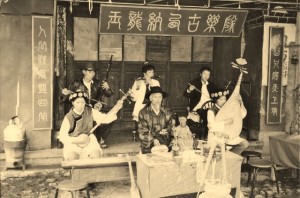 fell asleep during the concert and had to be awakened when it was time to play their parts. Xuan Ke, the Director, shared many biting stories about persecution during The Cultural Revolution. This old schoolmaster had played Schubert’s “Marche Militaire” to welcome the victorious Red Army into Kunming in 1949. His “attachment” to Western Culture had earned him 21 years in jail and crippled hands and scarred wrists from being strung up to the beams in the attitude of Christ on the Cross. I watched Cindy’s eyes widen… she opened up just like a rose… she’d found something deep inside her that she had never known was there. She was all youthful enthusiasm after what she had seen… and I felt content to have, perhaps, begun something in her.
fell asleep during the concert and had to be awakened when it was time to play their parts. Xuan Ke, the Director, shared many biting stories about persecution during The Cultural Revolution. This old schoolmaster had played Schubert’s “Marche Militaire” to welcome the victorious Red Army into Kunming in 1949. His “attachment” to Western Culture had earned him 21 years in jail and crippled hands and scarred wrists from being strung up to the beams in the attitude of Christ on the Cross. I watched Cindy’s eyes widen… she opened up just like a rose… she’d found something deep inside her that she had never known was there. She was all youthful enthusiasm after what she had seen… and I felt content to have, perhaps, begun something in her.
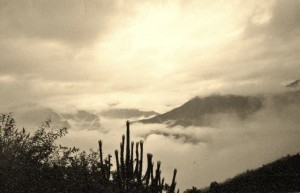 We spent the rest of the evening walking the streets of the Old Town… lit lotus candles to float down the canals… gathered with the jostling crowd of young people in the square as they did a circular Naxi dance. As the red lanterns began to blink out in the town and the shopkeepers closed their doors, we went back to the hotel reluctantly. In the morning we ate wild honey cakes and juicy little green pears for breakfast and slurped it all down with instant coffee. We ate in silence… sometimes bantered back and forth…
We spent the rest of the evening walking the streets of the Old Town… lit lotus candles to float down the canals… gathered with the jostling crowd of young people in the square as they did a circular Naxi dance. As the red lanterns began to blink out in the town and the shopkeepers closed their doors, we went back to the hotel reluctantly. In the morning we ate wild honey cakes and juicy little green pears for breakfast and slurped it all down with instant coffee. We ate in silence… sometimes bantered back and forth…
as if we had known each other one hundred years.
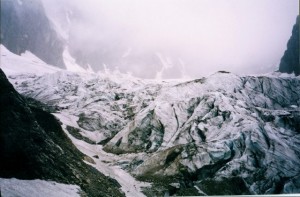 I never chose to have children. I had many reasons for that… but, in the last years I have had shared daughters of China. Now, so quickly older, they still stay in touch… they don’t ever seem far away. Cindy and Felix have now moved to Venezuela. She sends me pictures of her in a hardhat at the Port in Caracas handling the shipment of steel pipe for oil. She went to school to learn Spanish and now speaks like a Spaniard… and I smile to think that I made some suggestions in that direction. She tells me that she has become a little “importante” at the job. She says, “Paula, I am growing up.” I miss the laughter of Cindy in Kashgar and wish she were here.
I never chose to have children. I had many reasons for that… but, in the last years I have had shared daughters of China. Now, so quickly older, they still stay in touch… they don’t ever seem far away. Cindy and Felix have now moved to Venezuela. She sends me pictures of her in a hardhat at the Port in Caracas handling the shipment of steel pipe for oil. She went to school to learn Spanish and now speaks like a Spaniard… and I smile to think that I made some suggestions in that direction. She tells me that she has become a little “importante” at the job. She says, “Paula, I am growing up.” I miss the laughter of Cindy in Kashgar and wish she were here.
Daughters of China…who could have guessed?
They are my hope… they are my act of faith.
 |
 |
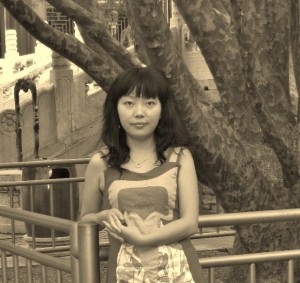 |
